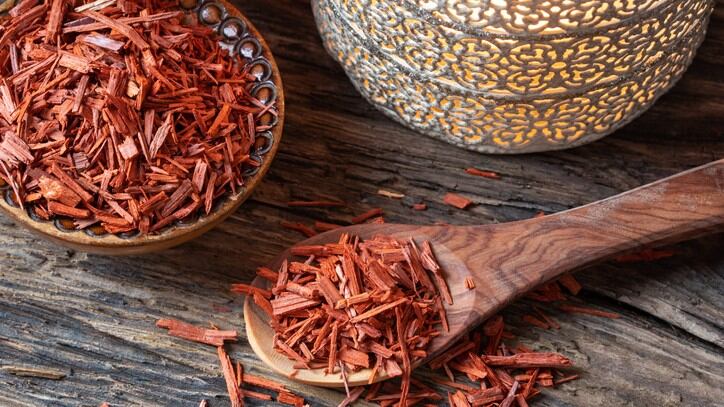Quintis has researched and discovered several cosmetic uses of Indian Sandalwood, or Santalum album, including as a potent antioxidant and an alternative to cannabidiol (CBD).
“Sandalwood is known as a fragrance in cosmetics but we’re finding a lot of really good evidence for the use of sandalwood as a cosmetic active ingredient. In our view, there are so many therapeutic benefits of sandalwood oil,” said CEO Richard Henfrey.
He added that Indian Sandalwood oil can tap into shift towards more a minimalist approach and offering more benefits to the consumer with fewer ingredients.
“There’s a real trend in cosmetics and skin care at the moment towards simplicity and the idea that you have one ingredient that might do the job of two or three ingredients. We're certainly interested in exploring that. [Indian Sandalwood] is more than a beautiful perfume. Just a small amount in a high-end skin care product adds natural anti-inflammatory and antioxidants activity in your skin care regime.”
Henfrey revealed to CosmeticsDesign-Asia that the firm is currently exploring the use of finely milled Indian Sandalwood as a powder that would potentially be able to replace talcum.
“What we’ve found is that very finely milled hardwood confers a lot of benefits. It’s a very smooth powder that conveys the benefits of the oil and has a really interesting mattifying effect. The way it absorbs the light can help to smooth skin tone and reduce the appearance of wrinkles – and it also smells fantastic.”
‘It’s safe to come back to Indian Sandalwood’
With so much potential for Indian Sandalwood beyond perfumery, Quintis is expecting demand for it to grow moving forward.
“We will harvest twice as much this year, as we harvested last year. We have plenty of opportunity to supply to all of those industries. We are also planting our first new plantation in about five or six years,” said Henfrey.
However, the company is now battling the troublesome reputation of Indian Sandalwood has cultivated over the past two decades as being an unsustainable resource.
Indian Sandalwood has been on the International Union for Conservation of Nature (IUCN) Red List of Threatened Species since 1998 and is still classified as a vulnerable species today.
“The last time an assessment was done in 2018, the situation was worse than it was in 1998, showing that it’s continued to be over-harvested, over-exploited,” said Henfrey.
Today, the trade of Indian Sandalwood is strictly controlled by the Indian government, but Henfrey said there was “no doubt” a grey market for illegal dealings still exists.
These troubles have pushed manufacturers away from Indian Sandalwood and toward other species. There are over 15 different species including Australian, Fijian, Hawaiian, and Pacific Sandalwood.
“However, it's the Indian Sandalwood that has the highest biological activity and the best evidence and the most tradition of use,” said Henfrey.
“Part of our job is getting to the root of the message that you don’t need to worry about buying Indian Sandalwood anymore because there is a sustainable source that is legal and ethical.”
In the early 1980s, Quintis was part of a successful trial by the Australian government to grow Indian Sandalwood. Since then, the company has built up an ethical and sustainable supply of Indian Sandalwood, with approximately 5.5 million trees across 12,000 hectares of land.
Henfrey said the company has continued to plant more trees over the years and expected its supply of Indian Sandalwood to be “in a position of balance” in about four to five years.
In February, the company announced that it has developed a 10-year sustainability plan to ensure the future of Indian Sandalwood. The report explores the actions needed to prioritise the long-term supply of Indian sandalwood.
The Hands on the Future Report highlighted several initiatives, including Quintis’s use of distillation technology which claims to reduce energy consumption by as much as 75% while maintaining a high quality of sandalwood oil.
Henfrey told us that this technology is now responsible for approximately 50% of its production.
He added that the company is committed to investing more into this technology and hope to increase its capacity to about 80% over the next four to five years.


